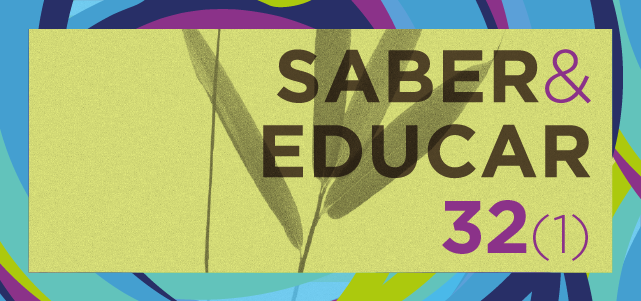Perspectives on childhood education from the observation of pedagogical practices in mathematics
DOI:
https://doi.org/10.25767/se.v32i1.32691Keywords:
Early childhood education, Pedagogical practices, Professional development, Supervised teaching practice, Mathematics TeachingAbstract
This article was constructed to understand the views of students of the Master's Degree in Pre-School Education and Teaching of the 1st Cycle on mathematics practices in a Pre-School context, based on an experience of the Curricular Unit of Didactics of Mathematics in conjunction with supervised teaching practice. Thus, we focus our study on a qualitative approach, framing it in the phenomenological-interpretative paradigm, using documental analysis of the work carried out by the students from the direct observation of pedagogical practices in the context of preschool education. The data were submitted to the technique of content analysis. The results indicate that the proposed activity promoted reflective processes through observation in a professional context; leading students to recognize the importance of creativity in the construction of teaching resources and carrying out tasks in an exploration context, as well as adapting pedagogical strategies to the needs and rhythms of children. Furthermore, they identify the interaction between children as a fundamental aspect of the development of meaningful learning, in which the educator is a promoter of intellectual challenges.
References
Alarcão, I. (2002). Escola reflexiva e desenvolvimento institucional: que novas funções Supervisivas? In J. Oliveira-Formosinho (Ed.), Supervisão na Formação de Professores (pp. 217-238). Porto Editora.
Alarcão, I. (2009). Formação e Supervisão de Professores: Uma Nova Abrangência. Sísifo, Revista de Ciências da Educação, 8, 119-128. http://sisifo.ie.ulisboa.pt/index.php/sisifo/article/viewFile/140/236
Amado, J. (2017). A investigação em educação e seus paradigmas. In J. Amado (Ed.), Manual de Investigação Qualitativa em Educação (3ª edição ed.). Imprensa da Universidade de Coimbra.
Bardin, L. (2016). Análise de conteúdo (5ª edição ed.). Edições 70.
Bicudo, M. A. (2006). Um ensaio sobre o conhecimento encarnado. In R. Meneghetti (Ed.), Educação matemática: Vivências refletidas (pp. 15-34). Centauro Editora.
Blank, R. K., & Alas, N. d. l. (2009). Effects of Teacher Professional Development on Gains in Student Achievement: How Meta Analysis Provides Scientific Evidence Useful to Education Leaders. Council of Chief State School Officers.
Bogdan, R., & Biklen, S. (1994). Investigação Qualitativa em Educação: Uma introdução à teoria e aos métodos. Porto Editora.
Cosme, A. (2009). Ser professor: A acção docente como uma acção de interlocução qualificada. LivPsic.
Cosme, A., Lima, L., Ferreira, D., & Ferreira, N. (2021). Metodologias, Métodos e Situações de Aprendizagem: Propostas e Estratégias de Ação. Porto Editora.
Decreto-Lei n.º 241/2001, 5370-5373 § I Série, nº 199 (2001) Estabelece o currículo dos ensinos básico e secundário e os princípios orientadores da avaliação das aprendizagens. https://dre.pt/home/-/dre/115652962/details/maximized
Doerr, H. M., Goldsmith, L. T., & Lewis, C. C. (2010). Mathematics professional development brief. In NCTM Research Brief. National Council of Teachers of Mathematics.
Ebby, C. B. (2000). Learning to teach mathematics differently: The interaction between coursework and fieldwork for pre-service teachers. Journal of Mathematics Teacher Education, 3(1), 69-97.
Freire, P. (1977). Educação Política e Conscientização (2ª ed ed.). Livraria Sá da Costa Editora.
Freire, P. (2016). Pedagogia da Autonomia: saberes necessários à prática educativa (53º ed ed.). Paz e Terra.
National Council of Teachers of Mathematics. (2017). Princípios para a Ação: assegurar a todos o sucesso em matemática. Associação de Professores de Matemática.
Niza, S. (2009). Contextos cooperativos e a aprendizagem profissional. A formação no Movimento da Escola Moderna. In A. Nóvoa, F. Marcelino, & J. R. d. Ó (Eds.), Sérgio Niza: escritos sobre educação (pp. 599 - 616). Tinta da China edições.
Pimenta, S. G., & Lima, M. S. L. (2004). Ensino de Didática. Cortez Editora.
Silva, I. L. d., Marques, L., Mata, L., & Rosa, M. (2016). Orientações Curriculares para a Educação Pré-Escolar. Ministério da Educação/Direção-Geral da Educação
Sociedade Portuguesa de Ciências da Educação. (2014). Instrumento de regulação ético-deontológica: Carta ética. Retrieved 18 de setembro de 2019, from http://www.spce.org.pt/PDF/CARTAETICA.pdf
UNESCO. (2021). Reimagining our futures together: A new social contract for education.
UNICEF. (1989). Convention on the Rights of the Child. United Nations.
Valério, E. (2002). Guia de Práticas de Supervisão Pedagógica: Uma perspetiva formativa. Editorial Presença.
Published
How to Cite
Issue
Section
License
Copyright (c) 2023 Louise Lima, Cristiana Madureira

This work is licensed under a Creative Commons Attribution-NonCommercial-ShareAlike 4.0 International License.
- The opinions expressed by the authors are their exclusive responsibility.
- The journal reserves the right to make the original, normative changes, spelling and grammar, in order to maintain the standard language of worship, while respecting the style of the authors.
- Authors retain copyright and grant the journal right of first publication with the work simultaneously licensed under a Creative Commons Attribution License (BY-NC-SA 4.0) that allows others to share the work with an acknowledgement of the work's authorship and initial publication in this journal.
- Authors are able to enter into separate, additional contractual arrangements for the non-exclusive distribution of the journal's published version of the work (e.g., post it to an institutional repository or publish it in a book), with an acknowledgement of its initial publication in this journal.
- Authors are permitted and encouraged to post their work online (e.g., in institutional repositories or on their website) prior to and during the submission process, as it can lead to productive exchanges, as well as earlier and greater citation of published work (See The Effect of Open Access).
PRIVACY STATEMENT
The names and email addresses entered in this journal site will be used exclusively for the stated purposes of this journal and will not be made available for any other purpose or to any other party.





